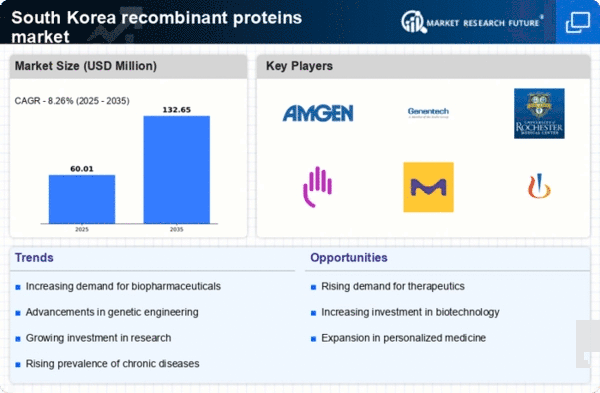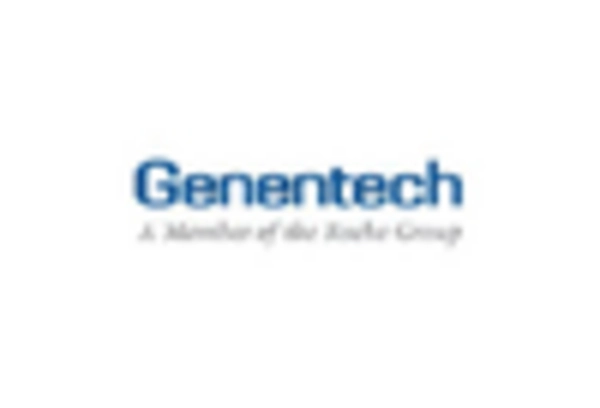Growing Biopharmaceutical Sector
The biopharmaceutical sector in South Korea is expanding rapidly, which serves as a significant driver for the recombinant proteins market. With a market size projected to reach $30 billion by 2025, the demand for biologics, including recombinant proteins, is on the rise. This growth is fueled by an increasing focus on personalized medicine and targeted therapies, which require sophisticated protein-based solutions. The recombinant proteins market is poised to capitalize on this trend, as pharmaceutical companies invest in the development of biologics to meet the evolving healthcare needs. Additionally, collaborations between academic institutions and industry players are fostering innovation, leading to the emergence of new recombinant protein therapies that address specific patient populations.
Regulatory Support for Biologics
Regulatory support for biologics in South Korea is enhancing the landscape for the recombinant proteins market. The government has implemented streamlined approval processes for biopharmaceuticals, which encourages companies to invest in the development of recombinant proteins. In 2025, the Ministry of Food and Drug Safety is expected to introduce new guidelines that further facilitate the approval of innovative therapies. This regulatory environment not only reduces the time and cost associated with bringing new products to market but also instills confidence among investors. As a result, the recombinant proteins market is likely to experience accelerated growth, with more companies entering the space to develop cutting-edge biologics that address critical health challenges.
Increasing Healthcare Expenditure
The rising healthcare expenditure in South Korea is a pivotal driver for the recombinant proteins market. As the government allocates more funds towards healthcare, the demand for advanced therapeutic solutions, including recombinant proteins, is likely to increase. In 2025, healthcare spending is projected to reach approximately $200 billion, reflecting a growth rate of around 5% annually. This financial commitment facilitates research and development in biopharmaceuticals, thereby enhancing the availability of innovative treatments. The recombinant proteins market stands to benefit significantly from this trend, as healthcare providers seek effective therapies to address chronic diseases and genetic disorders. Furthermore, the increasing prevalence of conditions such as diabetes and cancer necessitates the development of novel therapeutic proteins, further propelling market growth.
Rising Incidence of Chronic Diseases
The increasing incidence of chronic diseases in South Korea is a crucial driver for the recombinant proteins market. Conditions such as diabetes, cardiovascular diseases, and cancer are becoming more prevalent, necessitating the development of effective therapeutic solutions. In 2025, it is estimated that over 30% of the population will be affected by chronic illnesses, creating a substantial demand for recombinant proteins that can provide targeted treatments. The recombinant proteins market is well-positioned to address this growing need, as these proteins offer innovative approaches to disease management. Furthermore, the emphasis on preventive healthcare and early intervention strategies is likely to drive further investment in recombinant protein research and development, ultimately benefiting patients and healthcare systems alike.
Technological Innovations in Protein Production
Technological advancements in protein production are transforming the recombinant proteins market. Innovations such as CRISPR gene editing and improved fermentation techniques are enhancing the efficiency and yield of recombinant protein production. In South Korea, the biopharmaceutical sector is experiencing a surge in investment, with an estimated $1 billion directed towards research in 2025. These innovations not only reduce production costs but also improve the quality and efficacy of therapeutic proteins. As a result, the recombinant proteins market is likely to witness an influx of new products that cater to unmet medical needs. The integration of automation and artificial intelligence in biomanufacturing processes further streamlines operations, potentially leading to faster time-to-market for new therapies.
















